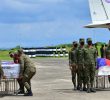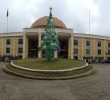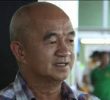With the killing of paramilitary leaders in Arakan Valley, the harassment against lumad leaders have intensified, and worst, they are carried out in the guise of pangayaw. For tribal leader Sergio Lumunday, such pangayaw is bereft of its true sense, which is done to defend the community when all other peaceful means have failed.
By DANILDA L. FUSILERO
Davao Today
ARAKAN VALLEY, Cotabato, Philippines — Fear engulfs lumad villages in this upland town as followers of slain military-backed tribal leaders strike back, hunting down community leaders who belong to an organization, in the guise of “pangayaw.”
Sergio Lumunday, a tribal leader in Tumanding Village, has left his home since August 6, after armed men came looking for him. A similar incident happened to Gunding Onsang, a Manobo leader of Katindu village.
The band who came to the homes of Lumunday and Onsang were said to be looking for leaders of Tikulpa or the Tinananon Kulamanon Lumadnong Panaghiusa (Tikulpa), a lumad organization.
Lumunday and Onsang, who are both members of Tikulpa, believe the men who came looking for them are members of Bagani, a known paramilitary group leader led by Jan Corbala, known as Kumander Iring.
Bagani is said to be backed by the Philippine Army’s 57th Infantry Battalion, just like the Blackfighters, the paramilitary group of the recently slain Cawsing Ogaw and Abantas Ansabo, also known as Kumander Ibon.
Ogaw and Ansabo, leaders of the Blackfighters, were killed last July 27. The Communist New People’s Army (NPA) has issued a statement admitting the killing of the two as “punishment” to “crimes of banditry, land grabbing, and murder of villagers.”
However, Lumunday and his fellows in Tikulpa are being blamed for the incidents.
“Ang NPA ang nagpatay kang Cawsing ug Ibon, nganong kami man ang basulon (The NPA has owned responsibility for the deaths of Cawsing (Ogaw) and Ibon (Ansabo). Why are they blaming us for their deaths?” Lumunday said.
Lumunday said members of Tikulpa are hunted down by these paramilitary groups even when Ogaw and Asabo were still alive, because of their opposition to the military presence reportedly to pave mining and plantation entry in their areas.
Tikulpa spans 68 tribal communities in the boundary of the municipalities of Cotabato and Bukidnon provinces.
With the killing of Ansabo and Ogaw, it seems to Lumunday that the harassment committed by the Baganis and Blackfighters against them have intensified, and worst, they are carried out in the guise of pangayaw, a practice of lumads where the act of waging war is justified.
For Lumunday, such pangayaw however, is bereft of its true sense, which is done to defend the community when all other peaceful means have failed.
Also, the pangayaw by tradition does not hide the real identity of those launching it, unlike, this one, where they wear bonnets.
“We don’t believe there is an ongoing pangayaw. This is a war, supported by the military, and designed to eliminate us,” Lumunday said.
Lumunday has not returned home since armed men were looking for him in his village.
The peasant group, Arakan Progressive Peasant Organization (Appo) describes the recent harassments of the paramilitary groups Bagani and Blackfighters as “part of the grand plan to put off the continuing campaign waged against the heavy deployment of military troops in the villages of Arakan that are opposed to activities that threaten to displace lumad communities.”
Carlos Anacleto, chairperson of Appo, identified such activities as mining and plantation, particularly, of napier grass, one of the recent foreign investor-backed projects in Arakan.
Catholic missionary Father Peter Geremia of the Arakan Parish called on the government to end the Armed Forces of the Philippines’ schemes of disintegrating the lumad communities in Arakan.
“This is not culturally-correct. It’s inhuman to allow lumads killing fellow lumads,” Geremia said. (Danilda L. Fusilero/davaotoday.com)
World









